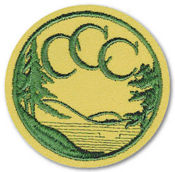Civilian Conservation Corps
The Civilian Conservation Corps (CCC) was a work relief program for young men from unemployed families, established in 1933, by President Franklin D. Roosevelt as part of his "New Deal" legislation. The program was designed to combat unemployment during the Great Depression and became one of the most popular New Deal programs, with projects in every state and several territories.
Roosevelt proposed conservation work as unemployment relief during the 1932 presidential campaign. The Emergency Conservation Work Act was signed into law on March 31, 1933. On May 7 Roosevelt extolled the CCC in a fireside address on the radio:
"First, we are giving opportunity of employment to one-quarter of a million of the unemployed, especially the young men who have dependents, to go into the forestry and flood prevention work. This is a big task because it means feeding, clothing and caring for nearly twice as many men as we have in the regular army itself. In creating this civilian conservation corps we are killing two birds with one stone. We are clearly enhancing the value of our natural resources and second, we are relieving an appreciable amount of actual distress."
Over 4,000 camps were established across the United States. North and South Carolina, Georgia, Alabama, Tennessee, Mississippi and Louisiana made up the Fourth of nine Corps Areas. In Alabama the CCC employed 20,000 men in projects in 13 state forests and seven state parks as well as numerous individual conservation projects. Overall expenditures reached $3 billion during the life of the program.
Eligible men were 18-25 years old and in families with unemployed fathers or otherwise on public relief. Exceptions were made for destitute veterans and for Native Americans, who were enlisted for separate projects on reservation lands. Enrollees signed up for six months, with the option to re-enlist for up to two years. For their labor they earned a minimum of $30 per month, $25 of which had to be sent back to the worker's family. By the time the CCC disbanded in 1942, over three million laborers had participated.
The CCC's camps were operated by the U.S. Army, using reserve officers as camp directors. Each camp had a federal sponsor, usually a division of the Interior or Agriculture departments which provided the project supervisor and hired "Local Experienced Men", who in turn trained CCC apprentices. The Army provided chaplains and contracted locally for groceries, fuel, equipment and medical services. Quasi-military discipline prevailed at CCC camps with laborers living in tents or barracks, working regular shifts and participating in planned sports and educational activities in the evenings. Clothes and food were provided.
The corps conducted numerous conservation projects, including prevention of soil erosion and the impounding of lakes. The CCC constructed many buildings and trails in city parks, state parks and national parks that are still used today. Other projects of the CCC included installation of telephone and power lines, construction of logging and fire roads, fence construction, tree-planting, and even beekeeping, archaeological excavation, and furniture manufacture. The CCC also provided the first organized wildfire suppression crews and planted an estimated 5 billion trees.
The American Federation of Labor feared that CCC training would expand competition for already-scarce jobs. Roosevelt promised there would be no skills taught that would compete with established unions, and he named labor leader Robert Fechner to run the CCC. Even so, skills courses such as motor repair, cooking, and baking were taught as well as basic literacy, U.S. history and civics.
Although the CCC was probably the most popular New Deal program, it never became a permanent agency. The last extension passed by Congress was in 1939. After the draft began in 1940 there were fewer eligible young men. When war was declared in December 1941, most CCC work, except for firefighting, was shifted onto U.S. military bases to help with construction there. Congress voted to cut off funding for the CCC entirely after June 30, 1942.
Projects in the Birmingham District
- NP-1: Oak Mountain State Park recreational demonstration area
- F-5 (1935) National forest project at Camp Riverside, 32 miles north of Double Springs
- SCS-7 (1935) Soil conservation project at Camp Clanohilala, 1/2 mile west of Clanton
- SP-8: Oak Mountain State Park road construction
- SP-10 (1938) State Park project at Moundville
- SCS-15 (1939) Soil conservation project 2.4 miles north of Cullman
- P-81 (1940) private forest project 8 1/2 miles northwest of Bessemer
- 1941: Erection of Wharton Lookout Tower on Ruffner Mountain
See also
References
- "Civilian Conservation Corps." Wikipedia, The Free Encyclopedia. 6 Jun 2008, 20:33 UTC. Wikimedia Foundation, Inc. 6 Jun 2008 [1].
- Pasquill, Robert Jr (2008) The Civilian Conservation Corps in Alabama, 1933-1942: A Great and Lasting Good. Tuscaloosa: University of Alabama Press. ISBN 9780817316211
- Salmond John A. (1967) The Civilian Conservation Corps 1933-1942: a New Deal case study Durham, North Carolina: Duke University Press
- Kenneth Holland and Frank Ernest Hill (1938) Youth in the CCC.
- Leighninger, Robert D., Jr (2007) "Long-Range Public Investment: The Forgotten Legacy of the New Deal"
- Paige, John C. (1985) The Civilian Conservation Corps and the National Park Service, 1933-1942: An Administrative History. National Park Service
